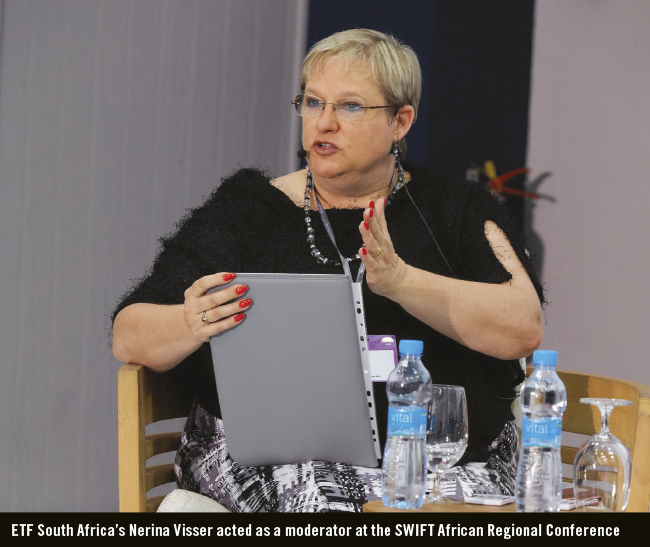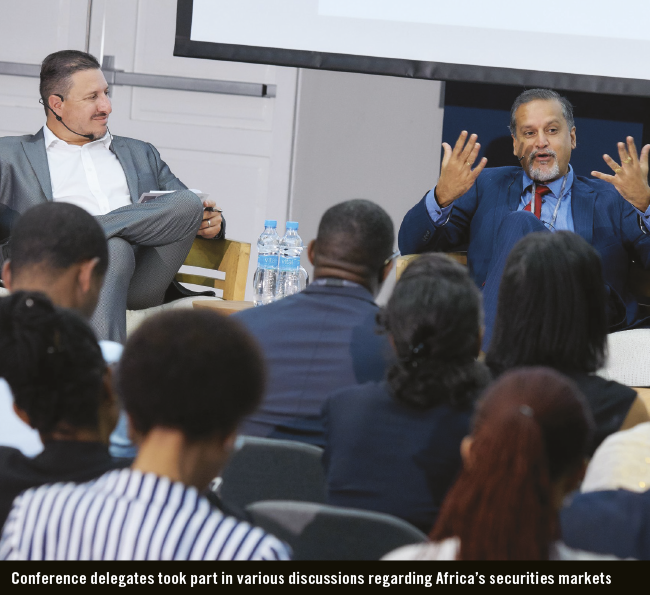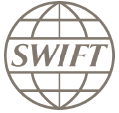The future of Africa’s securities markets was top of mind at the SWIFT African Regional Conference, which took place in Balaclava, Mauritius on 17 to 19 May. Bringing together more than 400 delegates from 48 countries, the event offered a platform to discuss some of the most significant issues facing the African continent today. Topics ranged from megatrends to the future of correspondent banking and disruptive technologies to financial crime compliance. Day two included a stream dedicated to the continent’s securities markets.
The first securities session looked at the growth of Africa’s securities markets and whether the continent has the right foundations in place to support intra-African trade. Iann Seymour-Smith, head of operations at central securities depository Strate, thinks not. ‘We haven’t built the foundations that we need. We have pockets of excellence but we don’t do enough together. We need to bring markets closer and build links between our market infrastructures.’
Africa’s securities markets focus on putting in place procedures that suit the international markets when they should focus on attracting African investment, argued Nerina Visser, exchange traded funds strategist and advisor from ETF South Africa, and moderator of the session. ‘We need to focus on what we can do for Africa within Africa. There is more than enough capital available on the continent. We don’t need to rely only on investment from the rest of the world. We need to improve connectivity between markets and make them accessible to other African investors.’
However, the challenge of increasing intra-African investment may not just be about linking infrastructure. According to Vipin Mahabirsingh, MD of the Central Depository & Settlement Co. in Mauritius: ‘Connecting infrastructure is important, but we are getting investment from UK and US investors, so clearly there is already access to our markets. Is it also a problem of lack of information or insufficient marketing? Maybe there is concern about a lack of diversification by other African investors.’
Standards and good governance are also critical – investors look for good governance and stability. Over the years, regulators have stepped in, increasing investor confidence. Within Africa, however, there are still challenges in terms of regulation.
‘Securities markets need to work with the regulator to come to a consensus as to what regulation actually means. This will increase investor confidence even further,’ says Sanjeev Jayram, head of corporate actions at Rand Merchant Bank.
Speed, efficiency and risk management will also become increasingly important in ensuring African markets are aligned more closely with international benchmarks and standards.
The move to the long-awaited T+3 settlement cycle in SA will be a big step forward. The shift itself will provide the market with numerous benefits, including attracting foreign investors by harmonising settlement with international standards and boosting liquidity, since assets will be released from the settlement process at a faster pace.
The implementation has been complex and challenging – involving multiple entities, including listed companies, traders, investors, clearing and back office participants, Strate, the JSE and all regulators.
SWIFT messages will be key in the implementation of T+3. The company is already supporting the SA market as the secure and reliable carrier of post-trade messages, which are built on internationally recognised ISO standards – ensuring consistency and therefore the ability to automate the processes and achieve high levels of straight-through processing.
SWIFT’s proven reliability and resiliency will also be crucial in this new environment, which will require operating systems to move from batch driven to real time.
Panellists agreed that supply is fundamental for the growth of Africa’s security markets. Currently, the number of listed products on most exchanges is severely restricted, preventing local investors from gaining exposure to African growth and international investors from increasing their exposure to African markets. Many argued that policy makers and stock exchanges need to provide incentives that encourage companies to raise money in the capital markets instead of relying on bank lending to fund their growth.
The second securities session continued this discussion. Mazi Capital founder and chief investment officer Malungelo Zilimbola agreed that there is a fundamental lack of listings, which are critical if markets are to grow and develop greater liquidity. Providing an alternative view as an African investor, Zilimbola says: ‘There is a need for privatisation in Africa, especially in the utilities market. Too much still sits with governments. We need a framework that will bring about private sector involvement. The money is there for investment, but it is waiting to be employed.’
Ian Bessarabia, SWIFT securities business development manager, underscored the value of African securities markets but asked whether they could be stronger together. ‘Despite slumps and obstacles in the markets, international investors are hungry for new markets and opportunities. They know that there are few remaining frontiers.’
Sunil Benimadhu, chief executive of the Mauritius Stock Exchange – which boasts 146 listings and a market cap of $10.6 billion – highlighted the vision for the country as an international financial centre. ‘We’re positioning Mauritius as an attractive hub for Europe to Asia and Asia to Africa. Africa inherently has very strong growth potential and the Stock Exchange of Mauritius will play an important role in enabling this growth,’ he says.
Africa holds many success stories, including the creation of Mauritius as a financial hub. Ghana’s decision to consolidate two central securities depository systems into one also demonstrated the right approach and reduced risk. The creation of Strate in SA is another important success story. ‘All of these can be used by other markets,’ says Deon Kruger, global head of operations for Standard Bank investor services. ‘We don’t have the luxury of wasting time and money to redefine models or standards. Too many successful examples already exist. These can be reused and reimplemented.’
Another hot topic was the potential for blockchain and distributed ledger technology (DLT) in financial and securities markets. But the journey to DLT will be a marathon, not a sprint. A recent SWIFT and Accenture paper analyses the opportunities and challenges of DLT in financial services, and identifies key factors for success. The research outlines eight critical factors that will pave the way for widespread adoption: strong governance, data controls, compliance with regulatory requirements, standardisation, identity frameworks, security and cyber defense, reliability and scalability.
A key ingredient to the success of this technology is an innovative mindset with a collaborative spirit, which African markets are not short of. With the right approach and understanding of what is the benefit for African markets, the technology could have a positive impact and allow these markets to leapfrog their global counterparts.
The key takeaway from both sessions of the conference was that collaboration is king. Africa’s securities markets will be stronger together, therefore connecting infrastructure, working with regulators, and clear communication between all parties is critical.
Join SWIFT and its community at the Business Forum South Africa in Johannesburg on 24 August and the Business Forum West Africa in Lagos in November. These events will focus on how Africa’s securities markets have evolved and the key factors that are set to shape their development.










